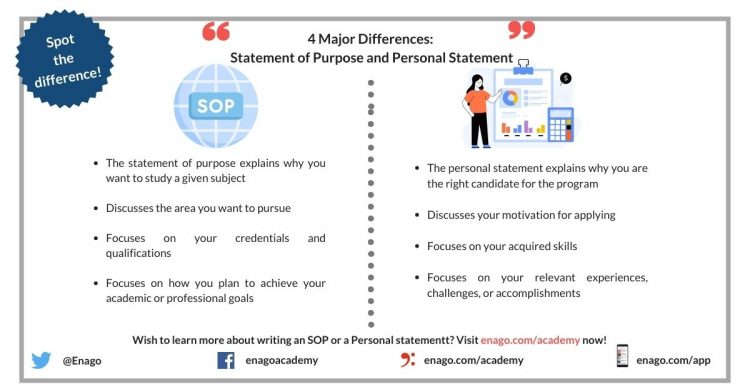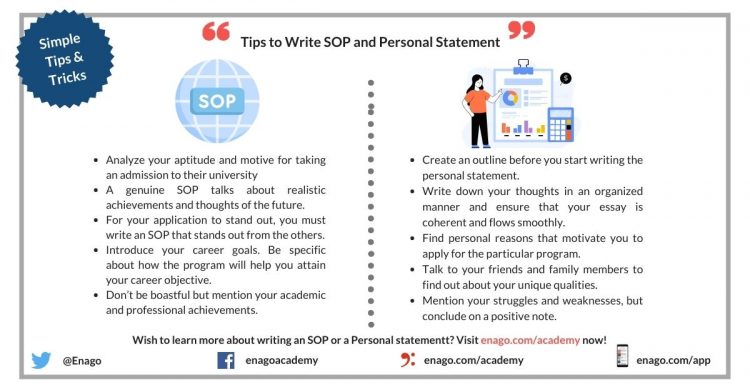Statement of Purpose Vs. Personal Statement – A Guide for Early Career Researchers

You were busy gathering information on how to apply for PhD programs abroad and you came across terms like Statement of Purpose (SOP), personal statement, letter of recommendation, etc. You are aware of these documents but how is one different from another, is still confusing. Your peers did mention how important these documents are while seeking admissions!
Among the researchers there always was confusion in understanding the difference between these academic documents. Moreover, many have a notion that statement of purpose and personal statement are the same. In this article, we will discuss statement of purpose vs. personal statement, why they are important, and which one to write when?
What is a Statement of Purpose (SOP)?
The statement of purpose is a letter that explains your rationale for applying to a graduate program and why an early career researcher is good for the program. The admission panel is interested to know why the candidate is interested in the program. This statement acts as a bridge to a possible candidate’s past and future in academics.
The early career researcher should have a substantial amount of experience in the field of research they are applying for. However, the program one applies to defines whether the early career research must mention their past experiences in the field of study. For example, it does not solve the purpose to mention the research experience in detail if they are applying for an MBA program.
Writing a statement of purpose requires understanding the academic journey. It is good to observe all the past events and life-changing turns in the career. This will help the candidate create strong reasoning for wanting to apply to the necessary program. Furthermore, once the candidate understands the academic past and possible future and does thorough background research, he/she must focus on how to create an original story.
A Well-Written Statement of Purpose
A well-written Statement of Purpose (SOP) could convince the admission panel to accept your application. The statement of purpose should have believable responses to questions such as –
- Why did you choose this school/university?
- Which field of research you are passionate about?
- Why you can’t pursue it in your country?
- Which Professor(s) is pursuing this field? And how does their work align with your interest?
- What do you want to gain from this academic experience?
- How has your background prepared you to develop this interest?
- What are your career goals?
- Why did you not score well on certain tests and what did you learn from that failure?
- And finally, what is special about you, and how does it set you apart from the rest?
What is a Personal Statement?
The personal statement is a personal note wherein the applicant writes about the personal as well as the academic background. The essay lets you share personal and professional experiences along with your academic experiences. However, there is less emphasis on research or future intent as compared to statement of purpose, in a personal statement.
In a personal statement, you are promoting yourself based on your skills as to why you are the right applicant for the particular course. Furthermore, it is essential to mention your readiness for the course and enthusiasm for the field you are applying for.
A candidate should add the following details while writing a personal statement –
- Candidates’ goals and values
- A personal story based on acquired skillset
- Discussion over what motivates the candidate
- Importance of the chosen course in today’s world.

Difference Between Statement of Purpose and Personal Statement
A statement of purpose explains why you want to study a given subject topic (it could be for a program) and a personal statement explains why you are a right candidate for a program. Furthermore, the statement of purpose discusses the area of interest while a personal statement discusses your motivation for applying.
An SOP focuses on highlighting the early career researcher’s credentials and qualifications. A personal statement focuses on the candidate’s acquired skills. Finally, a statement of purpose discusses how the candidate plans to achieve academic or professional goals. While a personal statement focuses on candidate’s relevant experiences, challenges, or accomplishments.
Statement of Purpose Vs. Personal Statement – Which One to Choose?
Choosing the right essay depends on the requirements of the universities because some institutions ask for a statement of purpose while others instruct for writing a personal statement. Some global graduation institutes would ask for separate statements and during admission they combine the qualities of both essays and may ask applicants to write a comprehensive essay. To find out which essay to write, it is good to check the university website, the requirement page will give details on the program.

Tips for Statement of Purpose Vs. Personal Statement
For Statement of Purpose –
- Help the admission committee to analyze your aptitude and motive for taking admission to their university. Thus, write what the admission committee wants to know.
- Admission officers read hundreds of SOPs in each academic session. Then can find flaws quite efficiently. However, a genuine statement of purpose that talks about realistic achievements and thoughts of the future will intrigue their interest.
- All applicants are equally worthy. For your application to stand out, you must write a statement that stands out from the others. Start with an interesting introduction to capture the admission officer’s attention. Starting with an incident or a real-life experience would be the best way to write an introduction for your statement of purpose.
- Introduce your career goals. Be specific about how the program will help you attain your career objective. Mention your objectives related to the program you are applying to.
- Don’t be boastful but mention your academic and professional achievements. Try to be precise about the achievements and your decision in choosing the particular program.
For Personal Statement –
- Create an outline before you start writing the personal statement. Write down your thoughts in an organized manner and ensure that your essay is coherent and flows smoothly.
- You need to find personal reasons that motivate you to apply for the particular program. Spend some time to check what motivated you and apply for the course specifically.
- Talk to your friends and family members to find out about your unique qualities. You could also ask for an honest opinion from your siblings, they will be a better judge of your qualities.
- Discuss your weaknesses or challenges that you overcame in recent years. Also, mention your struggles during school or college. In the end, conclude on a positive note, this will tell the admission committee that you can tackle any challenges and succeed in any field.
Conclusion
When it comes to statement of purpose vs. personal statement, they are written to influence the admission committee by presenting the most important information about your life in words. A statement of purpose is more formal, highlighting your academic or professional background. Meanwhile, a personal statement is a bit informal and focuses on your qualities as a person.
Did you know the difference between statement of purpose vs. personal statement? Did you write a statement of purpose or a personal statement? What ways did you follow to write these essays? Do write to us or leave a comment below!










great article to read
Your website provided alot of insight into the two keywords which are not found in many websites,however it will do good to include examples to further highlight the differences in the two words.Thanks
Great read. Thanks.
It’d be perfect to add some samples to further highlight the application of the differences.
Very well received with thanks.
I loved the information and I am willing to learn more
What is the difference between a Statement of Purpose (SOP) and a Personal Statement when applying for PhD programs abroad?
This is really a good guide. Thank you